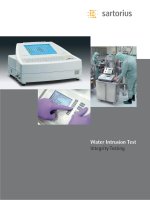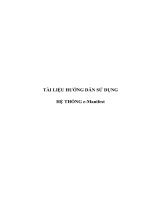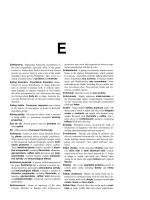E 717 84 (1999)
Bạn đang xem bản rút gọn của tài liệu. Xem và tải ngay bản đầy đủ của tài liệu tại đây (23.93 KB, 2 trang )
Designation: E 717 – 84 (Reapproved 1999)
Standard Guide for
Preparation of the Accreditation Annex of Acoustical Test
Standards1
This standard is issued under the fixed designation E 717; the number immediately following the designation indicates the year of
original adoption or, in the case of revision, the year of last revision. A number in parentheses indicates the year of last reapproval. A
superscript epsilon (e) indicates an editorial change since the last revision or reapproval.
5. General Requirements
5.1 Annex:
5.1.1 Include in the annex all mandatory accreditation
requirements, including all procedures, instrumentation, and
facilities specified in the test method (see also 3.1.1).
5.1.2 State the accreditation requirements with respect to
performance specifications wherever possible. Avoid requirements for specific test instruments, facilities, or procedures,
unless specifically prescribed in the test method.
1. Scope
1.1 This guide is intended to assist acoustical standardswriting groups in the preparation of laboratory accreditation
annexes for acoustical test standards (see 3.2.1).
2. Referenced Documents
2.1 ASTM Standards:
E 548 Guide for General Criteria Used for Evaluating
Laboratory Competence2
NOTE 1—Refer to by section number only those requirements that are
specified in other sections of the standard, rather than repeating a detailed
discussion.
3. Terminology
3.1 Definitions:
3.1.1 annex3—in acoustical test standards, a section that
contains information, such as details about apparatus or materials which is an essential and mandatory part of the standard,
but is too lengthy for inclusion in the main text.
3.1.2 appendix3—in acoustical test standards, a section that
is an informative and nonmandatory part of the standard.
3.2 Descriptions of Terms Specific to This Standard:
3.2.1 acoustical test—a test performed in accordance with
an acoustical standard established by a committee of a recognized standardization organization, such as, but not limited to,
ASTM Committee E-33 on Environmental Acoustics, ANSI
Committees S1 on Acoustics, S3 on Bioacoustics, and S12 on
Noise, and ISO committees.
3.2.2 shall—usually used in a phrase that describes a
mandatory requirement.
3.2.3 should—usually used in a phrase that describes an
optional or recommended requirement.
3.2.4 may—usually used in a phrase that describes an
optional or recommended requirement.
5.2 Appendix—Include in the appendix suggested requirements that are desirable but not essential to the test method.
6. Format of Accreditation Annex
6.1 General—The requirements in 6.2 through 6.4
should be included in the annex as required by the test method.
NOTE 2—Specify whether the requirements are mandatory or optional.
Use the word “shall” in statements that the writing group finds necessary
to demonstrate competence to perform the test.
NOTE 3—Practice E 548 prescribes generic attributes that should be
considered by technical committees or others in establishing specific
criteria for evaluating and accrediting testing laboratories.
6.2 Quality Assurance (Optional, see Note 4):
6.2.1 In-house Reference Samples.
NOTE 4—An accrediting agency may require a laboratory to participate
in additional quality assurance programs such as proficiency testing or
round robins on a blind sample. A writing group may wish to identify
appropriate proficiency test specimens.
6.3 Facilities:
6.3.1 Test rooms.
6.3.2 Sample preparation and conditioning areas.
6.4 Instrumentation:
6.4.1 Equipment.
6.4.2 Calibration.
4. Significance and Use
4.1 An accreditation annex identifies those elements that are
critical to the proper conduct of the test method.
1
This guide is under the jurisdiction of ASTM Committee E-33 on Environmental Acoustics and is the direct responsibility of Subcommittee E33.05on
Research.
Current edition approved July 27, 1984. Published September 1984. Originally
published as E 717 – 80. Last previous edition E 717 – 80.
2
Annual Book of ASTM Standards, Vol 14.02.
3
If other standards-writing groups have other usages of the term, they should so
indicate in their documents.
NOTE 5—For accreditation purposes, a laboratory may demonstrate its
compliance with instrumentation requirements by furnishing a list of the
manufacturer’s names, model designations, and serial numbers of its test
instruments wherever applicable.
6.5 Procedures:
Copyright © ASTM International, 100 Barr Harbor Drive, PO Box C700, West Conshohocken, PA 19428-2959, United States.
1
E 717
6.5.1
6.5.2
6.5.3
6.5.4
Sample selection, preparation, and mounting,
Testing procedures,
Calculations, and
Data reporting.
through 6.5.4) and how to evaluate whether a laboratory performs a test
competently. This group should assist in the identification of such
elements or evaluative procedures, if so requested.
7. Keywords
NOTE 6—The annex-writing group should keep in mind that accrediting
agencies need to know the “critical elements” in a test procedure (6.5.1
7.1 accreditation; acoustical
ASTM International takes no position respecting the validity of any patent rights asserted in connection with any item mentioned
in this standard. Users of this standard are expressly advised that determination of the validity of any such patent rights, and the risk
of infringement of such rights, are entirely their own responsibility.
This standard is subject to revision at any time by the responsible technical committee and must be reviewed every five years and
if not revised, either reapproved or withdrawn. Your comments are invited either for revision of this standard or for additional standards
and should be addressed to ASTM International Headquarters. Your comments will receive careful consideration at a meeting of the
responsible technical committee, which you may attend. If you feel that your comments have not received a fair hearing you should
make your views known to the ASTM Committee on Standards, at the address shown below.
This standard is copyrighted by ASTM International, 100 Barr Harbor Drive, PO Box C700, West Conshohocken, PA 19428-2959,
United States. Individual reprints (single or multiple copies) of this standard may be obtained by contacting ASTM at the above
address or at 610-832-9585 (phone), 610-832-9555 (fax), or (e-mail); or through the ASTM website
(www.astm.org).
2









